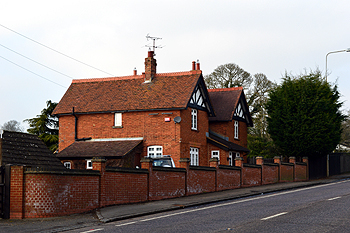A Counterfeit Coin
![White Horse Inn 1917 [AD3717]](/CommunityHistories/Hockliffe/HockliffeImages/White Horse Inn 1917 [AD3717].jpg)
White Horse Inn 1917 [AD3717]
At the Epiphany Quarter Sessions held at Bedford in January 1847 Thomas Black, a rope spinner from Deptford and "a female calling herself Jane Black, his wife" appeared charged with attempting to pass three pieces of counterfeit coin at Hockliffe and Chalgrave on 11 November 1846 [QSR1847/1/5/9-10].
In his deposition [witness statement] John Heckford, victualler and landlord of the White Horse Inn described how Thomas Black, Jane Black and a child had come into the tap room. Black had given him one shilling for a pint of beer, for which he gave them change. After they left he put the shilling into the till, where there was no other silver. When his stepdaughter later opened the drawer to get change she noticed the shilling was a bad one. Another witness, Emma Inwards, the daughter of William Inwards who kept the King's Arms public house, stated that at about 5 pm Thomas Black, the woman and child had come into the tap room. She served Black with three pennyworth of rum and took a shilling from him. She suspected it was bad but it was getting dusk and she did not say anything to the man. She locked the coin in a cupboard and showed it to her father when he returned. The man, woman and child all drank the rum, then left in the direction of Dunstable, which would have taken them past the White Horse. Her father corroborated her evidence.

The former Fleur-de-Lys February 2013
The next witness was Elizabeth Tomkins, a widow and landlady of the Fleur de Lis, who told a similar story. This time the woman had bought a pint of beer for a shilling. She said the coin felt "glib" but it was getting dusk and she did not notice it particularly. The woman warmed the beer and all three – man, woman, and child – drank it. As they left she heard the man say to the woman "We'll go on to the Bell at Dunstable and sleep". She also noticed the child call the man "Dad". They left in a few minutes in the direction of Dunstable which would take them past the Kings Arms. She had no other silver in her pocket apart from a sixpence she gave the woman in her change. She was later warned by Mr Inwards' son, checked the shilling and realised it was a bad one.
William Clough, the police constable stationed at Hockliffe, was informed about the counterfeit money and given the three bad shillings with a description of the culprits. He followed Black, his wife and child to Dunstable and found them at a lodging house there. He asked them where they had come from, and was told they had left London early in the morning. When charged with passing bad money at Hockliffe the man denied ever having bad money in his possession. He searched the man and found only good silver, as did the woman who kept the lodging house who searched Jane Black. On the way to Woburn the woman spoke of Black as her "old man" and did not call him her husband. He found a bundle on Thomas Black which included some white powder in a paper and large number of small articles. He gave the bundle to William Ralph Young, the superintendent of police, who examined it and found a small amount of white powder wrapped up in two papers. Black claimed it was sugar of lead to apply to his eyes but it was not – it was a mix of chalk and some other substance, and appeared to be the sort of stuff used for polishing metal.
Thomas Black denied ever having any bad money in his possession, denied passing the three shillings, and said he had never been in Hockliffe. He stated the woman was his lawful wife, her maiden name was West and they had married at St Mary's, Whitechapel on 27 or 28 June 1820. Jane Black denied ever passing bad money. She claimed they had only been in the house at Dunstable for two minutes before P.C. Clough came in and there would have been no time to hide any bad money. The court thought differently, finding them guilty of passing counterfeit coin and sentencing both Thomas and Jane Black to four months imprisonment with hard labour. Both Thomas and Jane are recorded in the Bedford Gaol Register. Thomas is described as stout, with a fresh complexion; his occupation is given as tramp / sailmaker, and during his time in gaol he was given knitting as prison work. Jane, also a tramp, was "lightly marked with the small pox", stout, and had lost most of her upper teeth. She was set to work mending prison linen [QGV10/2,11/2].